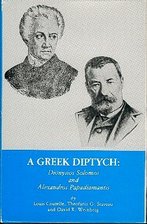λόγω λόγου
Δος μοι λόγον, Λόγε (1)
με τις θωπείες
των λέξεων ντύσε με
τον πολέμιο.
Στα θλιβερά μηδέν μου
το Ένα σου πρόταξε.
ουδέ τιν᾽ άλλην µύθου ποιήσασθαι επισχεσίην εδύνασθε (2)
ουδέ τιν᾽ άλλην µύθου ποιήσασθαι επισχεσίην εδύνασθε (2)
μα τα είδατε
τα πλοία των συντρόφων
να ποντίζονται.
Η πατρίδα σιωπηλή
δηλοί απομάγευση.
Εν αρχή ην ο Λόγος (3)
μα νωρίτερα
Εν αρχή ην ο Λόγος (3)
μα νωρίτερα
Έρως ασχημάτιστος
για τα μη όντα
και παραλοϊσμένος –
ώσπου συνέβης Όλος.
Ο λόγος σου με χόρτασε (4)
ωστόσο νιώθω
για τα μη όντα
και παραλοϊσμένος –
ώσπου συνέβης Όλος.
Ο λόγος σου με χόρτασε (4)
ωστόσο νιώθω
κατάδρομα στην κάψα
κρώξιμο τρένων
ποίηση ακάθιστη
έφιππους τους νεκρούς της.
εμός γάρ λόγος τούτοις επέλαμψε τοις επιζητούσι με (5)
εμός γάρ λόγος τούτοις επέλαμψε τοις επιζητούσι με (5)
τώρ’ αζήτητος
γδύνομαι απ’ το σώμα
και τα φύλλα του
και στη γωνιά μου στέκω
νέος έως θανάτου.
Πολλοί 'ναι οι δρόμοι πώχει ο νους (6)
Πολλοί 'ναι οι δρόμοι πώχει ο νους (6)
φως ποτιστικό.
Γι’ αυτό παραλογάω
κι ολοφύρομαι:
Ενεστώς Αόριστος
μαραίνει τις αγάπες.
Ψυχής πείρατα ιών ουκ αν εξεύροιο πάσαν επιπορευόμενος οδόν• ούτω βαθύν λόγον έχει (7).
Ψυχής πείρατα ιών ουκ αν εξεύροιο πάσαν επιπορευόμενος οδόν• ούτω βαθύν λόγον έχει (7).
Την Αρμονία
να ρέει απ’ το σώμα
έως τον βυθό
άπτερη επιποθώ
Κάλλος τετελεσμένο.
Αλλ’ έχετ’ εν φρεσί μύθον (8)
Αλλ’ έχετ’ εν φρεσί μύθον (8)
αν και οι σιωπές
σμήνος πουλιών σκοτίζουν
τη λογική μου.
Με σηκώνουν στα ψηλά
και με πετούν στη Γνώση.
Λαλήσωμεν, λαλήσωμεν - σιγή δεν μας αρμόζει (9)
Λαλήσωμεν, λαλήσωμεν - σιγή δεν μας αρμόζει (9)
και ό,τι γίνει.
Στον ύπνο δραπετεύεις
ωραιοπαθής
ευάλωτος σ’ αισθήσεις
και μύθους αγοραίους.
Übersetzung auf Deutsch von Théos Vótsos
Des Wortes wegen
Gib mir das Wort, Logos (10)
mit dem Zartgefühl
der Worte bekleide mich
den Kampfbereiten.
Meinen traurigen Nullen
deine Eins stelle voran.
und keinen anderen Vorwand konntet ihr geltend machen in euren Reden (11)
gleichwohl ihr saht sie
die Schiffe der Gefährten
im Meer versinken.
Die Heimat kündet still und
schweigend von Entzauberung.
Am Anfang war das Wort (12)
früher allerdings
ungestalteter Eros
für‘s Nichtseiende
und verfallen dem Irrsinn –
bis du Ganzes geworden.
Dein Wort ist mir genug (13)
dennoch spüre ich
der Gluthitze zueilend
Ächzen von Zügen
Dichtung in stehendem Akt
hoch zu Ross deren Tote.
mein Logos erleuchtete diejenigen, die nach mir verlangten (14)
nunmehr unverlangt
streife ich seinen Körper
und sein Blattwerk ab
und harre in meinem Eck
jung bis übern Tod hinaus.
Viele Wege stehen offen dem Geist (15)
fließend Quell des Lichts.
So rede ich irr daher
und raufe die Haare mir:
Präsens und Präteritum
lassen die Liebe welken.
Der Seele Grenzen kannst du nicht ausfinden, auch wenn du jegliche Straßen durchschrittest; so tiefen Grund hat sie. (16)
So begehre ich
dass bar von Schwingen fließe
einig Harmonie
vom Leibe bis zum tiefsten Grund
Vollendete Schönheit.
In eurer Brust aber bewahrt den Mythos (17)
auch wenn das Schweigen
gleich einer Vogelschar mir
den Geist verdüstert.
Es trägt mich in die Höhe
und führt mich zur Erkenntnis.
Lass uns reden, lass uns reden – das Schweigen ziemt uns nicht (18)
was immer geschieht.
Du fliehst in des Schlafes Trost
voll Selbstverliebtheit
empfänglich für Sinnesreiz
und Mythen, die käuflich.
Σημειώσεις
1. Από την Ορθόδοξη Υμνολογία της Μεγάλης Εβδομάδας.
2. Οδύσσεια, ραψωδία φ, 70-71: «Άλλη καμιά δεν έχετε να πείτε πρόφαση» (φράση της Πηνελόπης προς τους μνηστήρες).
3. Ιωάννου 1,1.
4. Λαϊκή ελληνική παροιμία.
5. Ρωμανού του Μελωδού, από Κοντάκιον της Αγίας και Πανσέπτου Γεννήσεως του Κυρίου ημών Ιησού Χριστού.
6. Από το β΄ Σχεδίασμα του συνθέματος «Οι Ελεύθεροι Πολιορκημένοι» του Διονυσίου Σολωμού.
7. Ηρακλείτου του Εφεσίου: «Της ψυχής τα πέρατα δεν θα τα βρεις, όποιο δρόμο κι αν πορευθείς, τόσο βαθύ λόγο έχει».
8. Προτροπή αποδιδόμενη στον Όμηρο, εξ ού και η μεταγενέστερη λέξη «εχεμύθεια».
9. Από το αποκηρυγμένο ποίημα του Κωνσταντίνου Καβάφη «Λόγος και Σιγή».
10. Aus der Hymnologie der orthodoxen Karwoche.
11. Penelope zu den Freiern, aus: Odyssee, 21. Gesang, 70-71.
12. Johannes 1.1.
13. Griechisches Sprichwort; wörtliche Übersetzung: deine Worte reichen mir zum Sattwerden.
14. Romanos Melodos, aus dem Kontakion auf die Heilige, überaus Heilige Geburt unseres Herrn Jesus Christus.
15. Aus dem 2. Entwurf des Gedichts „Die freien Belagerten“ von Dionysios Solomos.
16. Heraklit aus Ephesos.
17. Homer zugeordnete Aufforderung, aus der sich das spätere Wort «εχεμύθεια» (Verschwiegenheit/ Diskretion) entwickelt hat.






































